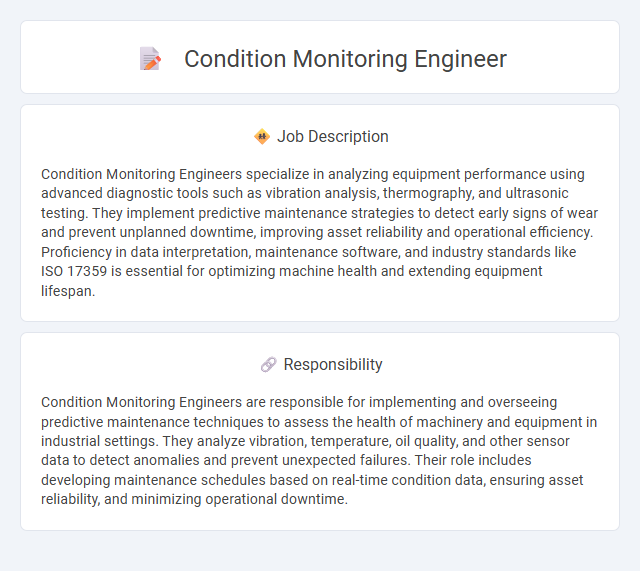
Condition Monitoring Engineers specialize in analyzing equipment performance using advanced diagnostic tools such as vibration analysis, thermography, and ultrasonic testing. They implement predictive maintenance strategies to detect early signs of wear and prevent unplanned downtime, improving asset reliability and operational efficiency. Proficiency in data interpretation, maintenance software, and industry standards like ISO 17359 is essential for optimizing machine health and extending equipment lifespan.
Individuals with strong analytical skills and a keen eye for detail are likely to be suitable for a Condition Monitoring Engineer role, as the job demands continuous assessment of machinery and systems for potential faults. Candidates who demonstrate resilience under pressure and effective problem-solving abilities probably adapt well to the dynamic environment of predictive maintenance. It is also probable that those with a background in engineering or related technical fields will have a smoother transition into this position.
Qualification
A Condition Monitoring Engineer typically requires a degree in mechanical, electrical, or industrial engineering, complemented by certifications in vibration analysis, thermography, or lubrication analysis. Proficiency in diagnostic tools like ultrasound, oil analysis, and condition monitoring software is essential for accurate machinery health assessment. Strong analytical skills and experience with reliability-centered maintenance practices enhance the ability to predict equipment failures and optimize maintenance schedules.
Responsibility
Condition Monitoring Engineers are responsible for implementing and overseeing predictive maintenance techniques to assess the health of machinery and equipment in industrial settings. They analyze vibration, temperature, oil quality, and other sensor data to detect anomalies and prevent unexpected failures. Their role includes developing maintenance schedules based on real-time condition data, ensuring asset reliability, and minimizing operational downtime.
Benefit
A Condition Monitoring Engineer likely enhances equipment reliability by predicting failures and scheduling maintenance proactively, potentially reducing downtime and repair costs. This role may improve operational efficiency through real-time data analysis and early fault detection. Employers could see increased asset lifespan and optimized maintenance budgets as significant benefits from employing a Condition Monitoring Engineer.
Challenge
Condition Monitoring Engineer roles likely involve tackling complex technical challenges related to predicting equipment failures and optimizing maintenance schedules. Engineers probably need to analyze vast amounts of sensor data, identify irregular patterns, and implement effective diagnostic solutions. The job may demand continuous learning and adaptation to evolving technologies and industry standards.
Career Advancement
Condition Monitoring Engineer roles offer significant career advancement opportunities through specialization in predictive maintenance technologies and data analytics. Expertise in vibration analysis, thermography, and ultrasonic testing enhances professional value, leading to senior technical or managerial positions. Continuous learning in AI-driven monitoring systems supports progression to roles such as Reliability Engineer or Maintenance Manager.
 kuljobs.com
kuljobs.com